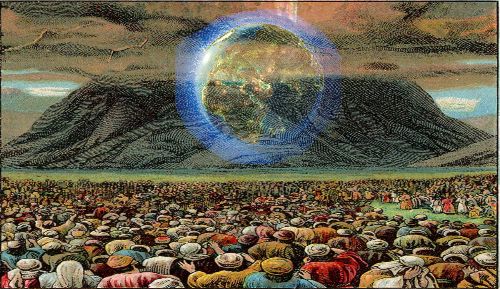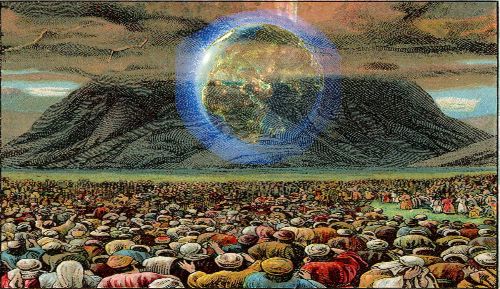Jewish Particularity & Purpose: A Sephardi Sage on Shabu’ot’s All-Embracing Essence

!חג שבועות שמח
From your friends at
The American Sephardi Federation
In honor of Shabu’ot, the ASF’s Sephardi World Weekly is pleased to offer the following “Letter from the Land of Israel”:
On the holiday of Shabu’ot (Shavuot), we celebrate how a distinctive national Jewish identity was forged with the revelation at Mt. Sinai. “National,” because the children of Israel received a set of general laws that directed them to living a Divine life. “Distinctive,” because the way of life embodied in those laws was different from anything else that existed in the world.
But the formation of Israel’s distinctive national identity raises a fundamental question that hasn’t lost one iota of its relevance for the past three thousand years: what exactly is the relationship between this particular people and the rest of the world? Did the Jewish People receive the revelation at Mt. Sinai for themselves alone, or is there some universal purpose that informs and animates Jewish national identity?
One of the great Hakhamim (Sephardic sages) of the modern period, the former Chief Rabbi of Salonica and the first Sephardi Chief Rabbi of Israel, R’Ben Zion Meir Hai Ouziel (1880-1953), offers an unequivocal answer to this question. The key to R’Ouziel’s answer lies in a term that appears throughout his writings, teudah, a slightly archaic word that in contemporary Hebrew usually means “certificate” or “diploma,” but that in his time meant purpose, aim, or mission. We previously examined some of the meanings that R’Ouziel attached to Israel’s teudah in his writings on the 9th of Av and the causes of Israel’s national self-destruction. R’Ouziel’s thoughts on Shabu’ot add another dimension to our investigation. In short, even though R’Ouziel was a passionate national patriot who celebrated the uniqueness of the Jewish people and whose life was shaped by learning Torah and observing the mitzvot (commandments), he unambiguously asserted that the revelation at Mt. Sinai and the concomitant formation of Jewish nationhood was animated by a universal mission. What’s more, on the holiday of Shabu’ot we are called upon to meditate upon the content of that mission.
According to R’Ouziel, when the revelation took place at Mt. Sinai fifty days after the Exodus from Egypt, God established an “eternal covenant” in which, “Israel was entrusted with the great mission (teudah) to be a light unto the nations and to fulfill the vision of the end of days of perfecting the world under God’s sovereignty, and filling the land with the knowledge of the Lord.” Moreover, the revelation at Sinai and the giving of the Law preceded the entry into the land and the establishment of national sovereignty: “The exalted and comprehensive idea of perfecting the world under God’s sovereignty preceded the establishing of Israel’s nationhood and statehood, and provides its form and direction.”
To be clear, “perfecting the world under God’s sovereignty” is not restricted to the religious sphere. According to R’Ouziel, “Judaism’s mission (teudah) is nothing less than the exalted aspiration to elevate humanity… to the highest level of human perfection.” A plurality of powers is embraced in this perfection: “scientific and artistic, economic and aesthetic,” and R’Ouziel considered it a religious obligation to aid in cultivating human excellence wherever it might appear. He even extended the aspiration to human elevation to the global political sphere:
Israel’s mission (teudah) is to issue a call for peace to all of humanity… Israel’s redemption cannot be a particular redemption, but the redemption of all of mankind from its many lethal wars, from its servitude to strange ideologies, superstitions and tyrannical regimes, or to false religious hypocrisy. Judaism does not aspire to change the order of the world and the values of life. Rather, its great aspiration is to abolish religious and political rule that exploits and abuses, dominates and oppresses…
R’Ouziel anchors his view on Judaism’s global role in the words of the sages, and in so doing he offers an innovative and unique interpretation to an important Talmudic passage that, historically, has been interpreted in terms of Israel’s particularity. In contrast, R’Ouziel discerns a universal dimension to the text. The sages teach that, “There is no difference between this world and the days of the Messiah except for emancipation from subjugation to the kingdoms” (Berachot 34b, Sanhedrin 91b). This text is usually interpreted to refer to Israel’s emancipation from non-Jewish kingdoms. According to R’Ouziel, however, “That which will be abolished in the days of the messiah is not only for Israel, but is for all of humanity… only conscious awareness and true knowledge of God… will judge and rule.”
By emphasizing the broad, humanistic aspect of Israel’s universal mission, R’Ouziel was of course arguing against narrow interpretations of Israel’s identity and mission that limit Judaism to religious study and praxis but that remain dominant in ultra-orthodox circles today. In R’Ouziel’s view, however, “Relegating the mission (teudah) to the synagogue and the study hall… is storing away and burying our national mission (teudah).”
That said, by giving precedence to Israel’s mission over her material, political reality, R’Ouziel was also arguing against the political Zionist perspective that is articulated in Israel’s Declaration of Independence, according to which, “The Land of Israel was the birthplace of the Jewish people. Here their spiritual, religious and political identity was shaped.” The perspective articulated in Israel’s Declaration of Independence is a reflection of 19th century conventions regarding the inseparable unity of land and nationhood, but R’Ouziel was not party to those conventions. Thanks to the revelation at Mt. Sinai, R’Ouziel could imagine an ideal nationhood that precedes any connection to the land.
Continue reading below…
~~~~~~~

The American Sephardi Federation invites all individuals, communities, and organizations who share our vision & principles to join us in signing the American Sephardi Leadership Statement!
Please also support the ASF with a generous, tax-deductible contribution so we can continue to cultivate and advocate, preserve and promote, as well as educate and empower!
~~~~~~~
R’Ouziel was at once prodigious scholar of traditional Jewish texts who passionately advocated for the centrality of education and observance of the commandments, as well as a passionate Zionist, who devoted his life to developing the Jewish community in the Land of Israel. His “Spiritual Will,” composed shortly before his passing, proved to be one of the most moving documents of the Zionist tradition. Nevertheless, against both the exclusively spiritual perspective of the ultra-orthodox and the excessively political perspective of secular Zionists, R’Ouziel believed that Israel’s national identity is animated by a universal mission whose roots will always remain spiritual and ideal, not material.
This Shabu’ot, the American Sephardi Federation invites our readers to follow R’Ouziel’s lead and to, “look upon that holy mission (teudah) that we received upon ourselves on this day to be ‘a kingdom of priests and a holy nation.’” The two parts of this famous phrase speak to the two-fold character of Israel’s national identity: ‘Kingdom of priests’ refers to Israel’s universal mission. After all, there are no priests without a people, and in this case, the people in question is humanity at large. Likewise, ‘a holy nation’ refers to Israel’s singularity. Ultimately, this is the paradox of Jewish national identity: animated by its universal mission, Jewish nationalism is not simply another variation on a universal model. It is, as such, different in kind.
¡Shabuot Alegre!
The American Sephardi Federation
